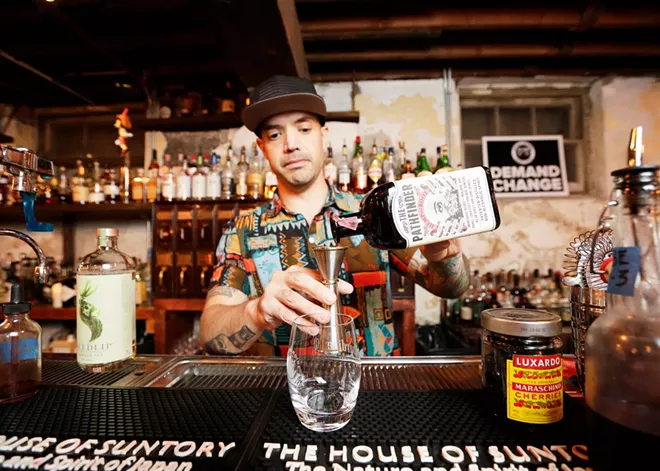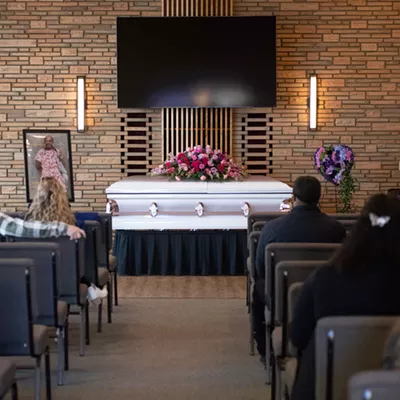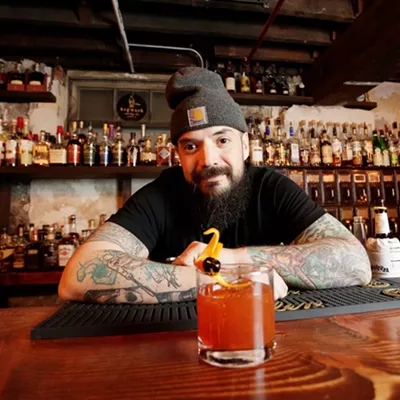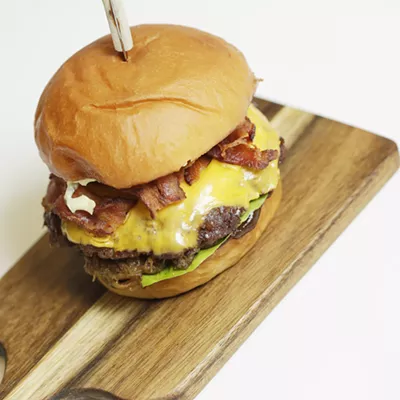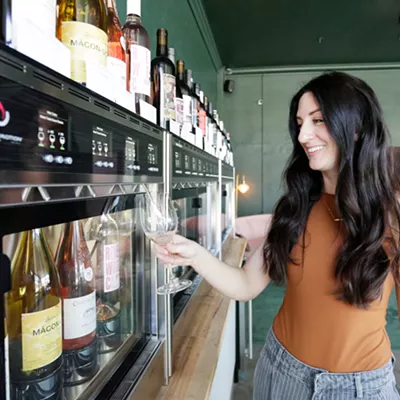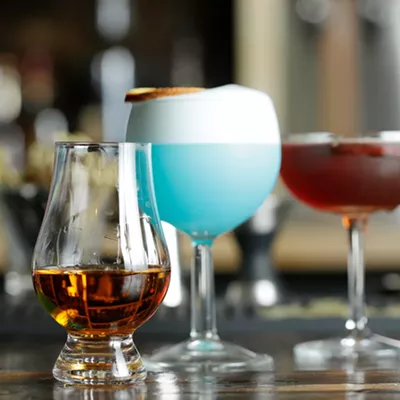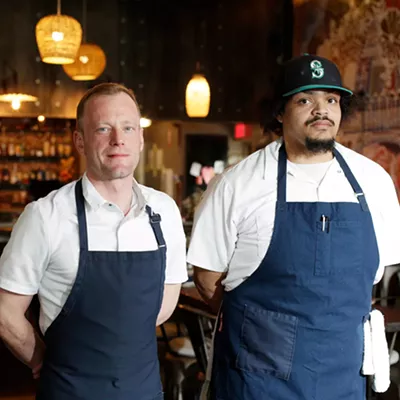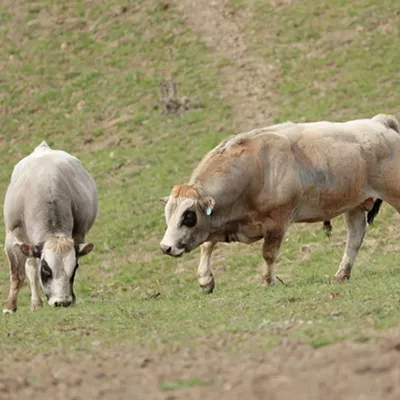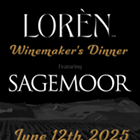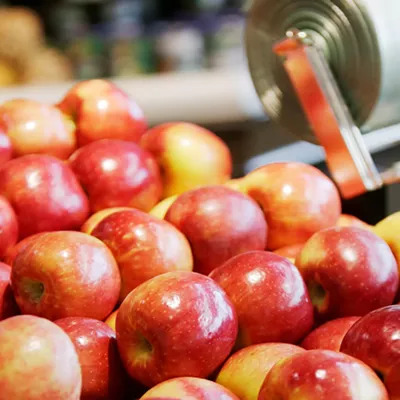One of America's most-beloved bartenders never took a shot with a regular.
Sam Malone, heartthrob of the all-American TV show Cheers and owner of the titular bar, was supposed to be a washed-up Red Sox relief pitcher who lost his career to alcoholism, got sober and promptly opened a bar. Perfect setup for a ridiculous '80s sitcom, right?
It's not so far out as you might think. A handful of barkeeps in Spokane don't drink alcohol themselves. People behind the bar at downtown places like Ruins, Bowery, Hogwash Whiskey Den and Mootsy's have learned how to control the balance of a cocktail and also the urge to drink one.
If you're "sober curious," as the Gen-Zers say, or losing your nerve this Dry January, or skeptical that it's possible to have a fun night out without tequila, a chat with some local sober bartenders might give you something to think about. They don't drink for different reasons, but they've come to similar conclusions — they feel great, they still have friends, and they still love hanging out at bars. And they all want to provide that place where everybody knows your name, regardless of if you're drinking or not.
Last year, Jessica Hubacher felt a pain in her stomach.
"Of course, you Google and you start to freak out," the co-owner of Audubon's Radio Bar says.
All the tests came back negative, which is a good thing, but she still didn't have any answers. Hubacher decided to cut out alcohol just until she could figure out what was going on. Finally, her hair dresser, or "hair-apist," as Hubacher affectionately calls her, asked if the pain might be brought on by that powerful, enigmatic force: stress.
"I feel like I'm high-functioning, all-the-time busy. I didn't really think I was stressed out," Hubacher says. "But looking back, yeah, that was probably just stress. I didn't recognize it."
Hubacher started making time to take care of herself, reintroducing yoga and meditation into her routine. But the thing she didn't bring back? Alcohol.
"I just stopped drinking, and then I never went back," she says. "It's been one year, and I'm gonna keep it going. But I will still go out and drink NA or eat or whatever. Absolutely."
Nonalcoholic, or NA, drink options have been a part of Hubacher's life for a long time. Her husband, Jimmy, has participated in Dry January for years. Her best friend has struggled with sobriety, so providing safe and celebratory spaces for her has long been on Hubacher's mind. Radio Bar's list of mocktails boasts complex and surprising flavors that make everyone feel included no matter what they're drinking.
"It's really important to have that as an alternative, not only for Dry January," Hubacher says. "I feel like people associate drinking with fun. That's not the case for me. I like to play cribbage, and I like to play games, and I like to eat. Then I get to drive all my friends home. I don't have a hangover, and I can get up and walk my dog. I wish I could say I was running a marathon. I thought it was going to be a really huge change for me. But I just gradually stopped drinking and gradually felt better. I just feel good."
Simon Moorby drank himself out of a job. Several, actually. After a half gallon of Johnny Walker and a three-day blackout, he was unhoused, unemployable and alone. He had hit rock bottom.
Moorby was a "unicorn" in the 12-step program, someone no one expected to pull through but did. Under strict probationary conditions, he returned to restaurants, an industry he had risen to the top of as a 20-something.
This time, he started over as a dishwasher. He went through the ranks again, sober. He regained the trust of some, though not all, of the people who had previously trained him. Since 2016, Moorby has been the bar manager at Hogwash Whiskey Den, trying to put his mentors' belief in him to good use.
"I've worked dive bars, diners, Thai food, classically trained French restaurants, fine dining," he says. "All of those years of experience and training, I can apply all of them still to my profession now. So none of that is a waste."
Moorby will be nine years sober this April. He spends most of his time at Hogwash, guarding shelves of liquor, creating new cocktails and pouring shots for friends. Why put himself in the belly of the beast day after day after day?
"Ultimately, it's not just an expression of mastery of drink. It's also an expression of self-mastery. I've been able to rise above so many personal struggles that I'm now capable of not only facing that demon but also showcasing my mastery of it at the same time. It's showcasing the strength that I've acquired along the way."
"I think it was Kanye who said, 'Never trust a sober bartender.' But I think he's proven himself an idiot by now."
At 36, Sara Thorpe was diagnosed with Borderline Personality Disorder. A couple years later, she decided to get serious about managing the condition. She never meant to go sober, but thought she'd briefly cut out alcohol to see what happened.
"My main goal was just to do 30 days as an experiment to see how my brain reacted to it," she says. "It turns out I just loved it and I never went back."
Thorpe started bartending at Mootsy's after 30 days sober. Today, she's almost 700 days sober, and still the life of the party.
"There's a stigma around sober people that they're no fun," she says. "I really set out to change that when I decided to live an alcohol-free life. A large portion of my life is connecting with friends and doing social activities. So I made it a point to continue on with the exact same lifestyle as my friends. The consumption of alcohol is not the problem. But there are mental health problems that are exacerbated by the consumption of alcohol. Sometimes when we have issues that we need to work out, it's best to remove some substances."
Thorpe started The Plus One Podcast to share her experience with Borderline Personality Disorder and break down stereotypes of mental health and sobriety. She hopes people feel free to make decisions that are best for them.
"Once I realized how sad I was while I was drinking, I just never wanted to be that sad again," she says. "So the trade-off for me was really easy. I still think it's fun. I still think it's exciting. I still think the flavor combinations are incredible, and I love to create new things. So just being able to still create has kept bartending exciting for me."
"There's a lot of people who start drinking alcohol as a way to celebrate and end up using it as a way to cope. If you find yourself dipping into the coping part of it, then it's probably time to take a look at your relationship with alcohol." ♦
SOBER CURIOSITY SATISFIED
Looking for a night out with all the fun but none of the booze? Check out Diversion Events' first sober nightlife event for an evening that's "intentionally dry and effortlessly edgy," says co-founder Bailey Bowerman.
The inaugural event at 22Rooms on West First Avenue features high-end nonalcoholic drinks and treats from First Avenue Coffee, plus music, dancing, an Electric Photoland photobooth, and flash tattoos by Honey B Studios.
Diversion Events, also co-founded by Christine Burns, offers a new kind of night out in Spokane and Coeur d'Alene for anyone who's sober-curious. Two events are planned each month. Guests are only asked to arrive sober and keep an open mind.
"We aren't here to judge how you live your life. It's not really our business," says Burns. "We're just here to offer a diversion to the typical night out."
— ELIZA BILLINGHAM
Diversion Events Grand Opening • Fri, Jan. 12 from 8-11 pm • $25 online; $30 door • 22Rooms • 1011 W. First Ave. • instagram.com/diversion_events


